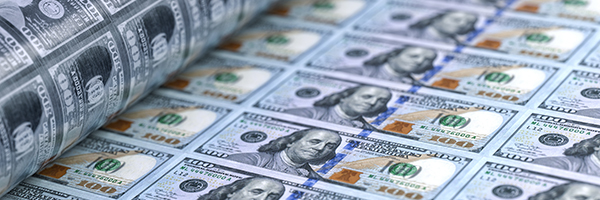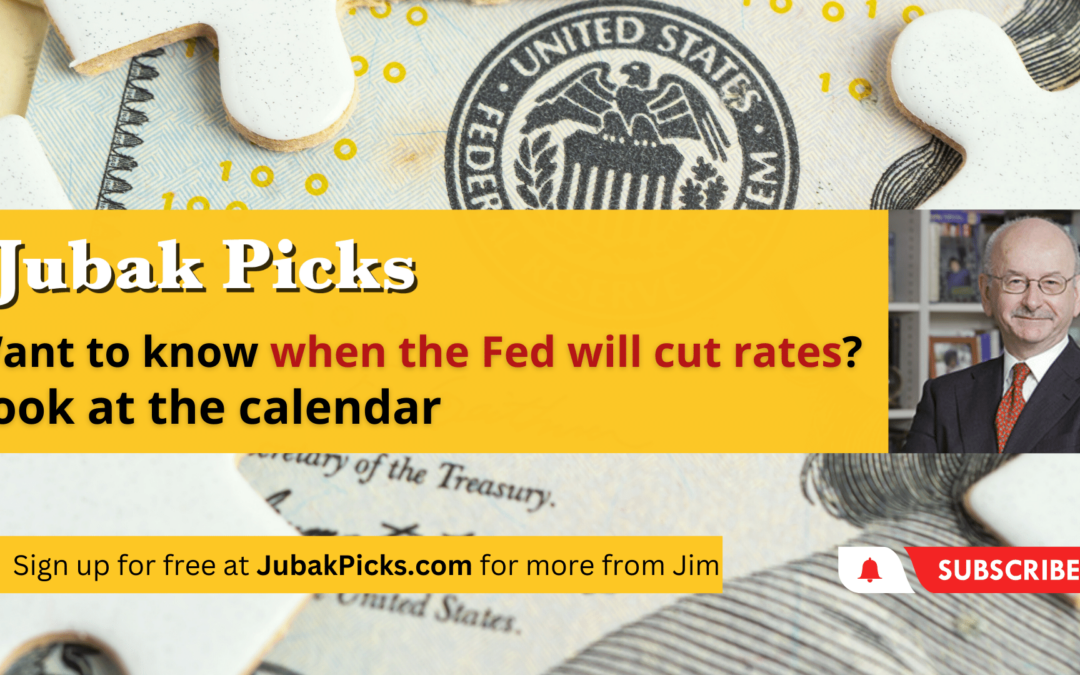
May 5, 2024 | Daily JAM |
I expect surface quiet but important movement in the lower depths of the financial markets. The week ahead lacks in obvious market-moving events and reports. There’s a smattering of earnings with Disney (DIS) on May 7 and Toyota Motor (TM) on May 8. But nothing from the likes of Apple (AAPL) or Microsoft (MSFT). A few speeches from Federal Reserve officials–Fed governors Lisa Cook on May 8 and Michelle Bowman on May 10. But no Fed meeting. No testimony from Fed chair Jerome Powell. But deep in the workings of the bond market, this will be a big week. The Treasury will auction $112 billion in Treasury paper.

May 4, 2024 | Daily JAM, Short Term |
The U.S. economy added 175,000 jobs in April, the Bureau of Labor Statistics announced on Friday. That was the smallest number monthly new jobs in six months. The unemployment rate ticked up to 3.9%. And traders tried once again, to get ahead of the data. Concluding that slower job growth, meant the Federal Reserve would be more likely to cut interest rates sooner–in September, say, rather than November or December–bonds rallied and yields fell. The yield on the 10-year Treasury dropped 7 basis points to 4.5%. The yield on the 2-yer Treasury, which had been flirting with 5% earlier in the week, fell to 4.82%. Stocks climbed with the Standard & Poor’s 500 up 1.26% and the NASDAQ Composite gaining 1.99%. Trouble is that these moves were the exact opposite of gains and losses earlier in the week.
May 2, 2024 | Daily JAM, Morning Briefing, Short Term |
On Wednesday, May 1, the Federal Reserve decided NOT to cut interest rates at its May 1 meeting. That was the decision expected by the financial markets. And Federal Reserve chair Jerome Powell tried his best to keep traders from speculating that the Fed would actually raise interest rates, rather than cut them, in the remainder of 2024.

April 30, 2024 | Daily JAM, Morning Briefing |
The employment cost index (ECI), which measures wages and benefits, increased 1.2%, the most in a year, after rising 0.9% at the end of 2023, according to a report from Bureau of Labor Statistics on Tuesday, April 30. The increase was greater than projected by any economist in Bloomberg’s survey of economists.Compared with a year earlier, the ECI, the Fed’s preferred measure of employment costs, climbed 4.2% after a similar annual increase in the fourth quarter.

April 26, 2024 | Daily JAM, Mid Term, Morning Briefing |
Yesterday we had a report of core Personal Consumption Expenditure for March that showed core inflation ticking up to an annual rate of 3.8% from 3.7%. Core inflation, if you remember, looks at prices after excluding more volatile food and energy prices, The reasonable conclusion was that inflation was remaining stubbornly higher than the Federal Reserves % target. And that the first cut to interior rates from the Fed wouldn’t come until December, instead of July or September. Today we got the report on all-items PCE inflation.

April 25, 2024 | Daily JAM, Morning Briefing, Short Term |
U.S. economic growth slowed in the first three months of the year, the Bureau of Economic Analysis reported today. Gross Domestic Product (GSP) grew at an annualized rate of just 1.6%. That’s a big retreat from the 3.4% annual rate in the fourth quarter of 2023. Just as important as the drop in the growth rate itself is the reason for the decline.

April 24, 2024 | Daily JAM, Morning Briefing |
One down and billions more to go.
Yesterday’s big auction of 2-Year Treasury notes saw rock solid demand that let the day pass without a big, destabilizing drop in prices and a jump in yields. Today, in Round #2, the Treasury is set to auction off $70 billion in five-year notes. So far, at least, the sale looks like it will see solid demand again. Though, can I say, You ain’t seen nothing yet? Treasury is likely to increase its monthly issuance of the seven main notes and bonds (not including TIPS) by nearly 60% in 2024 to $354 billion in August 2024, from the $222 billon it issued in July 2023, according to “Neutral Issuance” scenario in the presentation by the Treasury Borrowing Advisory Committee.

April 21, 2024 | Daily JAM, Mid Term |
It’s been a tough month for Treasuries with yields rising on a re-thinking of when the Federal Reserve might begin to cut interest rates. The yield on the 10-year Treasury closed at 4.62% on Friday. That’s an increase in yield of 35 basis points in a month. (When yields climb, bond prices fall.) And this week the Treasury will auction a combined $183 billion of two-, five- and seven-year Treasury notes. Ans that’s ahead of the latest update on the Personal Consumption Expenditures index, the Federal Reserve’s preferred inflation measure.

April 17, 2024 | Daily JAM, Videos |
Today’s video is Want to know when the Fed will cut rates? Look at the calendar. The Fed only has so many meetings left for 2024 and even fewer if you only coun those with Dot Plot updates of the Fed’s economic projections. The Fed is on the verge of a major shift in policy and the U.S. central bank almost never makes a big policty shift at a meeting without an update of its economic projections.. Early in the year, people were looking for up to five cuts, now, sentiment has shifted to one or fewer. If we get a rate cut at all, when will it be? Look at which upcoming Fed meetings include Dot Plots. The Fed doesn’t like to surprise investors and if they make a drastic change, like a shift to rate cuts, you can bet they want to do it while they’re also discussing projections for 2024 and 2025. The.CME Fedwatch Tool currently odds for the next meeting, May 1, at a 98% chance of no cut and the June meeting is now up to an 84.8% chance of no cut. The June meeting WILL have a Dot Plot and, up until recently, the finanial markets believed that meeting that would deliver the news. Because the Fed generally likes to give in-depth information during a big policy shift, it’s unlikely that the rate cut will be in July, since no dot Plot economic pdate is scheduled for that meeting. The next real chance of a rate cut, I think, is September 18, which has a Dot Plot. (There is no August Fed meeting.) The market thinks there will be a cut in September, and CME Fedwatch has the odds of no cut at that meeting at just 32.7%. A second rate cut in 2024 would have to be at the December 18 meeting, the final 2024 meeting with a Dot Plot. (The Fed doesn’t meet in Ocrober and the November meeting does include a Dot Plot update.) Without the September cut, it’s very unlikely there will be two cuts in 2024. Unless inflation data changes a lot, I doubt we’ll have two rate cuts, but we can look for one in September or December at this point.

April 12, 2024 | Daily JAM, Mid Term |
All good things come to an end. After seven straight quarters of record levels of profits from net interest income, the spread between what earns by lending and what it pays depositors to raise funds, JPMorgan Chase (JPM) reported that net interest income slightly missed analyst estimates for the first quarter. The quarter the company reported today certainly wasn’t a disaster. The bank earned $23.1 billion in net interest income in the period, up 11% from the first quarter of 2023. But the end of the beat and raise guidance of the last year and a half plus an increase in costs were enough to lead to substantial selling today, April 12. The shares finished the day down 6.47% at $182.79. Analysts and investors were clearly hoping for more.

April 5, 2024 | Daily JAM, Special Reports |
Step 4: Build a short-term Treasury bond ladder The yield on the 10-year Treasury bond climbed another 7 basis points today, April 5. That’s a gain in yield of 23 basis points in one month. So yes, it’s time to build a bond ladder in Treasuries.

March 20, 2024 | Daily JAM, Morning Briefing, Short Term |
The Federal Reserve unanimously voted to leave the benchmark Fed Funds rate in a range of 5.25% to 5.5%, the highest since 2001, for a fifth straight meeting. They left their projections in the quarterly Dot Plot for the Fed Funds rate by the end of 2024 at 4.6%. That was the same projection as in the December Dot Plot. And nothing in either the post-meeting press statement or in Fed chair Jerome Powell’s press remarks changed the timing on when the Fed will make its first interest rate cut.










